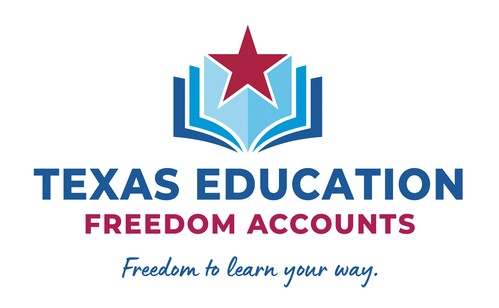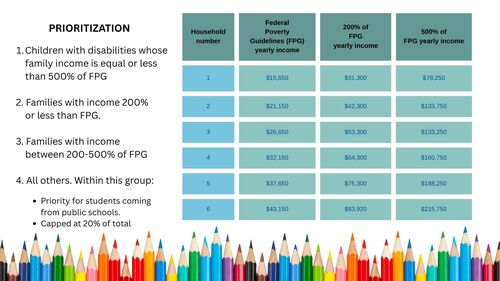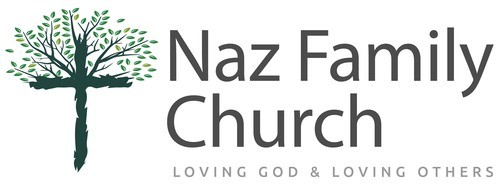
Texas Education Freedom Accounts were established by the 89th Texas Legislature through Senate Bill 2. Through this program, eligible families can apply for state funds to help pay for educational costs such as career and technical education programs, tutoring, private school tuition, home-school expenses and other approved services.
The state has budgeted $1 billion which will serve approximately 70,000 students statewide. Participants choosing an accredited private school approximately between $10,000 and $12,000 each for education costs. A child with a diagnosed disability may receive up to $30,000, according to the amount the child's school district would receive if the child were enrolled in public school based on the child's individualized education program (IEP) from the public school.
Home school participants receive $2,000.
The state has budgeted $1 billion which will serve approximately 70,000 students statewide. Participants choosing an accredited private school approximately between $10,000 and $12,000 each for education costs. A child with a diagnosed disability may receive up to $30,000, according to the amount the child's school district would receive if the child were enrolled in public school based on the child's individualized education program (IEP) from the public school.
Home school participants receive $2,000.
Who can receive these funds?
In order to be eligible for this program, the student must be a U.S. citizen, national or lawful resident eligible to attend a Texas public school. Siblings are approved together, so if one of your children is chosen, all of your children will be chosen.
All students may apply and have a chance to be chosen each year, but students are chosen according to a prioritization system. The highest priority groups will be children with special learning needs and from low-income families. Families can reapply each year until they are chosen. Once your students are in the program, they are in for the duration. The family will not need to reapply each year after that. Unused funds may roll over each year with no rollover limit while the student participates in the program.
There are four prioritization categories:
Funding for Pre-K has different guidelines. Pre-K funding is only available for families who qualify for free public pre-k, which is students who are English as a Second Language, foster care, military, or very low income.
All students may apply and have a chance to be chosen each year, but students are chosen according to a prioritization system. The highest priority groups will be children with special learning needs and from low-income families. Families can reapply each year until they are chosen. Once your students are in the program, they are in for the duration. The family will not need to reapply each year after that. Unused funds may roll over each year with no rollover limit while the student participates in the program.
There are four prioritization categories:
- Children with disabilities whose family income is equal or less than 500% of the Federal Poverty Guidelines
- Families with income 200% or less than the Federal Poverty Guidelines
- Families with income between 200% and 500% of the Federal Poverty Guidelines
- Everyone else.
Funding for Pre-K has different guidelines. Pre-K funding is only available for families who qualify for free public pre-k, which is students who are English as a Second Language, foster care, military, or very low income.

What can these funds be used for?
Approved expenses include the following:
All expenses will be paid through an app after your student is accepted into the program. Only vendors and schools that are approved by the Texas Education Freedom Accounts program will be eligible.
- Tuition and fees for a private school,
- Tutoring
- Uniforms
- Online Education Programs
- Therapies for students with special needs
- Textbooks or other instructional materials
- Costs of computer hardware or software required by a provider or prescribed by a physician
All expenses will be paid through an app after your student is accepted into the program. Only vendors and schools that are approved by the Texas Education Freedom Accounts program will be eligible.
What is required of Parents?
Parents must agree to the following:
- Only spend money for eligible expenses
- Share your child's assessment results with the Texas Education Freedom Account program
- Not sell an item purchased with program money
- Notify the program within 30 days of child enrolling in public school, graduating high school, or otherwise becoming ineligible to enroll in public school.
How do we apply?
While the details have not been fully released by the Texas Comptroller office, enrollment for families is expected to open in January of 2026 for the 2026-2027 school year. Families will need to apply through the website (we will list that site here as soon as it is available). They will need documents to prove citizenship, income and disability (if available). The application process should only take about 10 minutes. At the end of the application period, families will be informed if they are accepted for the year or not. If accepted, families will be given further instructions then.
Important Dates
- September 1, 2025: SB 2, the bill creating ESAs, becomes law.
- November 2026: Final rules and details will be released by the Texas Comptroller Office. Vendors and schools may apply.
- January 2026: The application process is expected to open for families to apply.
- School year 2026-27: Money in ESAs can first be used for eligible expenses.
Other Items of Note
- A child with a disability, as defined by the State of Texas,
- Is not more than 21 years of age and has a visual or auditory impairment that prevent the student from being adequately or safely educated in public school without the provision of special services OR
- is at least 3, but not more than 21 years of age and has one or more of the following disabilities that prevents the student from being adequately or safely educated in public school without the provision of special services: physical disability; intellectual or developmental disability; emotional disturbance; learning disability (this includes dyslexia); autism; speech disability; or traumatic brain injury.
The parent of a child not enrolled in a public school may request a school district to provide an evaluation and to develop an IEP for the child.
Federal and state laws regarding the provision of educational services to a child with a disability apply differently for private schools versus public. Parents must be provided with notice from the Texas Education Freedom Accounts regarding the rights to which a child with a disability is entitled if the child attends a public school.
- A public school must provide records to the parent of a child seeking to participate in the TEFA program or to a private a school at the parent's request. A school district, TEA or charter school must provide information to the Texas Education Freedom Account program to verify a child's eligibility to participate in the program.
- Approved private schools that wish to participate in this program must
- Be accredited by TEPSAC or TEA
- Annually administer a nationally norm-referenced assessment for ESA participants in grades 3-12
- Have continuously operated a campus for at least 2 school years preceding participation in ESA program
- Have a financial review according to accreditation rules
- Approved vendors/providers that wish to participate in the program must
- be a a provider of supplemental special education services previously approved by TEA.
- be a school district or charter school accredited by TEA and able to provide services or products to participating children in a manner that the children are not counted toward average daily attendance
- be a qualified private tutor, therapist or teaching service employee
- be a higher education provider that demonstrates nationally recognized postsecondary education accreditation.
- The state may not impose limits or requirements contrary to religious or institutional values of a provider, vendor or participant regarding curriculum, admissions practices, operations, policies, standards, etc. An education service provider or vendor that receives ESA money is not a recipient of federal assistance and may not be considered a state actor.
Sign up for More Updates
You can sign up for new updates and information about the Texas Education Freedom Accounts at the following places
Texas Private Schools Association: https://texasprivateschools.org/families/school-choice
Texas Comptroller ESA Program Website: https://comptroller.texas.gov/programs/education/esa/
Texas Private Schools Association: https://texasprivateschools.org/families/school-choice
Texas Comptroller ESA Program Website: https://comptroller.texas.gov/programs/education/esa/
